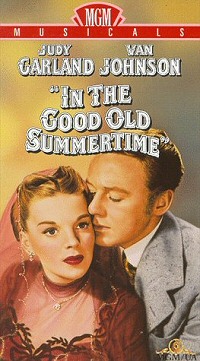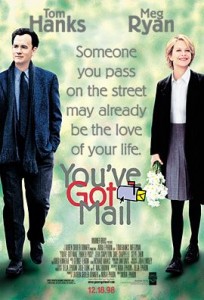
Margaret Sullavan and James Stewart in “The Shop Around the Corner”: heart-to-heart, but not eye-to-eye. MGM, 1940/Wikimedia Commons
—————————————
In a world of reality television and cheesy stadium-pop music, finding good, intelligent escapist entertainment is a lot harder than it ought to be. The idea is to tickle your brain, not insult it, and tickling takes a certain deftness with the feather that far too many entertainers lack.
I turn to certain writers. Jasper Fforde and the outrageous wordplay of his Thursday Next and Nursery Crime novels. John Mortimer and his Rumpole stories. Ellis Peters and her Brother Cadfael medieval mysteries. Thurber and Wodehouse and Christopher Buckley, whose Little Green Men and Thank You for Smoking so audaciously straddle the line between cynicism and glee. I listen to good musicians performing Cole Porter. I watch Gene Kelly or Ann Miller or Gregory Hines dance. I revisit the raw brilliance of John Belushi in Blues Brothers or Animal House, or his comic soulmate Jack Black in School of Rock.
 And I watch chick flicks. Not just any chick flick, but the well-written, well-performed ones that tend to fall into the folds of screwball or romantic comedy. Yes, I like the movies of Nora Ephron, and if that drums me out of the league of tough-guy arts observers, so be it.
And I watch chick flicks. Not just any chick flick, but the well-written, well-performed ones that tend to fall into the folds of screwball or romantic comedy. Yes, I like the movies of Nora Ephron, and if that drums me out of the league of tough-guy arts observers, so be it.
What exactly is a chick flick? The term’s a mild put-down that means something like, “inconsequential fluff that panders to womanly emotions,” but that’s a short-sighted way of looking at things. Isn’t the supposedly feminine point of view — that pursuing happiness is better than winning through intimidation — the crux of the civilizing process? Better Katharine Hepburn leading Cary Grant on a wild goose chase than Dirty Harry making his day with a gun in your face, although Harry has his lower-cortex satisfactions, too.
 The best chick flicks exude optimism, which of course makes them immediately suspect in intellectual circles. (Then again, a lot of intellectuals miss the point that Waiting for Godot is as much a vaudeville comedy as it is an existential outcry: Even Beckett enjoyed a good giggle.)
The best chick flicks exude optimism, which of course makes them immediately suspect in intellectual circles. (Then again, a lot of intellectuals miss the point that Waiting for Godot is as much a vaudeville comedy as it is an existential outcry: Even Beckett enjoyed a good giggle.)
But in a good chick flick, the optimism isn’t blind. It’s based on a belief that personal fulfillment is a matter of finding the right fit in life. That fit most likely involves finding the right romantic mate (although it could also be the right profession or cause or community), which in a larger sense means discovering the truth about yourself and putting yourself in a position where you don’t have to pretend.
And while the consummation might be a juicy kiss or an “I do” and is certainly about sexual attraction, it is more deeply about finding the person whose quirks and foibles you can put up with for a lifetime, because the underlying connection is profound.
 It’s a coupling of equals built on compromise and respect, and it typically involves wriggling out of a bad potential match and shedding several layers of self-delusion so you can see the simple beauty of what ought to be. That often requires eating a few slices of humble pie and taking some practical steps. In that sense, Jane Austen is the mother of all chick flicks. And Shakespeare, with his comic creations of Kate and Petruchio in The Taming of the Shrew and Beatrice and Benedick in Much Ado About Nothing, might be their grandpa.
It’s a coupling of equals built on compromise and respect, and it typically involves wriggling out of a bad potential match and shedding several layers of self-delusion so you can see the simple beauty of what ought to be. That often requires eating a few slices of humble pie and taking some practical steps. In that sense, Jane Austen is the mother of all chick flicks. And Shakespeare, with his comic creations of Kate and Petruchio in The Taming of the Shrew and Beatrice and Benedick in Much Ado About Nothing, might be their grandpa.
In a good chick flick, you know the ending right off the bat. That bugs a lot of critics, who complain that the show is predictable and formulaic. So it is. But so what? Sure, you know where the story’s taking you, but how you get there is most of the fun. The ride can be as raunchy as Bull Durham or as raucous as Working Girl or as delicate as 84 Charing Cross Road. The variety that lives inside familiarity is astonishing, and becoming comfortable with the little surprises of the familiar is one of the pleasures of life.
If the critical challenge of the chick-flick hero and heroine is to bring a split personality into harmony — the “false” personality of social striving and mistaken assumptions giving way to the “true” personality of inner self-awareness, even as it steels romantic idealism in the crucible of practicality — then Miklos Laszlo‘s 1937 Hungarian play Parfumerie is an almost perfect example of the form. Set in Budapest, it’s about a pair of shop clerks who bicker through their everyday lives but who also indulge in an idealized, platonic affair with an unknown pen pal, eagerly awaiting the next heartfelt letter of devotion. Continue reading Escaping to reality: Chick flicks and the comic spirit